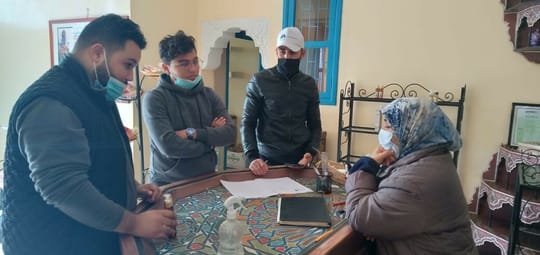USAID Farmer-to-Farmer Local Volunteer Developing Local Capacities

The High Atlas Foundation (HAF) continues promoting sustainable economic growth, food security, and agricultural development in Morocco through the USAID Farmer-To-Farmer (F2F) program. The F2F team developed an assignment that seeks to build and improve the web presence of two cooperatives (Mogador and Mejji) in the Essaouira province to increase the value of their production. Similarly, the assignment aims to develop online stores that will allow these two cooperatives to sell more of their Argan-based products on the internet, develop their marketing exposure, build the capacity of their staff to maintain their respective websites, and, therefore, increase the income of these two cooperatives and their members.
Previously, these two cooperatives have benefited from 804 argan trees provided by FRÉ Skincare and HAF, a partnership agreement which was further extended by conducting women’s empowerment training workshops with other women’s cooperatives in the province. FRÉ has since established and is now expanding an argan tree nursery to serve cooperatives of the entire province, as well as farming communities in the Taroudant province.
F2F team members, accompanied by local F2F volunteer Anass Mouatik, visited the two cooperatives in Essaouira and met their members. The F2F local volunteer utilized a participatory method in order to collect information about their products. He also had the members imagine various aspects of the marketing process such as how they want to present their products online, to whom they will sell, what prices they are considering, and if they would like to focus on exporting globally or just national/local markets.
All of the information gathered helped the local F2F volunteer figure out how the online platform stores will look. It also enabled him to provide some direct recommendations to the hosts. The most important feedback for the associations concerned the packaging. The F2F volunteer suggested they include the associations’ existing organic certificates in the design, which will clearly reinforce the product’s value and increase its price.
Anass will commence developing these online stores very soon. He will return to each site in the near session for videography sessions. When the cooperatives will have all their Argan products ready, he will help them make short videos about the whole chain of processing Argan (from the tree to the bottle). These videos will help increase the associations’ exposure on the market, build content for their online presence, and help them gain valuable validation of their processes to increase the sales of their products. F2F team, local volunteer and paired remote US volunteer Abraham Wilcox will have an online meeting this week to discuss assignment progress.